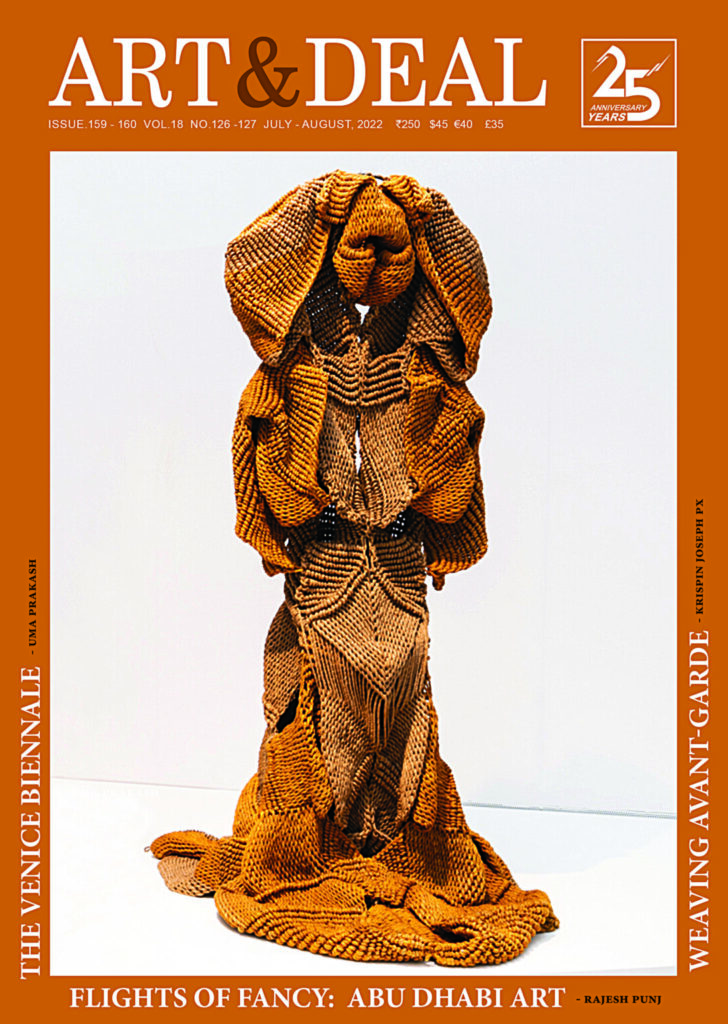Uncertain States
An interview with Bharti Kher
Part-II, continued from previous issue
Rajesh Punj
“As I said, you act as a witness, and some of the works that have come out in the past two years, if I look at them in retrospect are really about what is happening. I am not writing a story but the imagery comes instinctively. Or the sensibility of the work, the angst and awkwardness of the piece comes from the environment, because you make work about where you live, about who you are and where you are from” – Bharti Kher 
London born, Delhi based artist Bharti Kher’s practice draws from her own unique view of her environment. The notion of being an ‘outsider’ in some respects, and yet also an individual of Indian origin, gives her a unique perspective on her own existence within the society she lives in, and of the status-quo of life around her. She is committed to exploring misunderstandings and social codes within society, and her research through the visual medium is somewhat an ethnographic exploration. She succeeds in delivering a forceful and thought provoking image of India.
Intending with her work to challenge social and cultural norms, she empowers her practice with politics and personal ambition.
Following on from the March issue of Art & Deal containing Part 1, we conclude Rajesh Punj’s interview with Bharti Kher following her exhibition at Galerie Perrotin, Paris, in late 2016.
I am just a creature of habit and I like it. So I like going to my studio everyday at ten o’clock and working the whole day, and of going home and thinking today I started a new project; I did something. And I like materials, to push them to do things that they are not supposed to do.
RP: Do you think the audience has changed? Do you
think they have become more sophisticated?
BK: No I think I have changed. I think we change
don’t we? Maybe art has changed. Maybe that is the
nature of our psyche.
RP: I mean to say do you think the audience expect
more from the artist now?
BK: What do you think?
RP: I think they do, we are in and of a globalised
culture that expects more, and it is as if we think we
deserve more from it.
BK: The audience can be monolithic.
RP: I am constantly reading about contemporary
art whilst looking back at modern art, and I think
there is something incredible about modern works
whereby the audience were in genuine awe of what
they were given. And it was part of a cultural
experience that bridged over into literature,
language, film and fashion. I think of the American
‘beat generation’ when I describe such a collective
phenomena. Contemporary art seems to exist in and
of itself as culture and the crowd have acclimatised
to everything being radical and revolutionary, with
a corporate ‘c’.
BK: Maybe that is just the nature of the beast, in
terms of the art world now. Art has become a circus
styled spectacle, and it has become corporate and
part of the entertainment industry at the same time.
You can stay there; you can play that game if you want
because we are all players. We are all in the gallery
system. Let’s not all be holier than thou. We are all
players, we are all in it and you have to decide what
makes us happy.
You can only perform if that’s part of you. Some
people do it really well, they are really good at it, and
you think ‘wow’ that’s a great piece. The scale is huge,
the ambition is gigantic,and the execution suggests
there is a lot of support. I think the art world is quite
interesting now. I think what it has become is a lot
more inclusive, including practitioners from other
disciplines, and I think that that is really interesting,
including collectives. I think it (the scene) is much
bigger, and as a consequence it is much harder to
hold everyone’s attention. It is much harder to know
about everyone now. It has become a full-time job.
